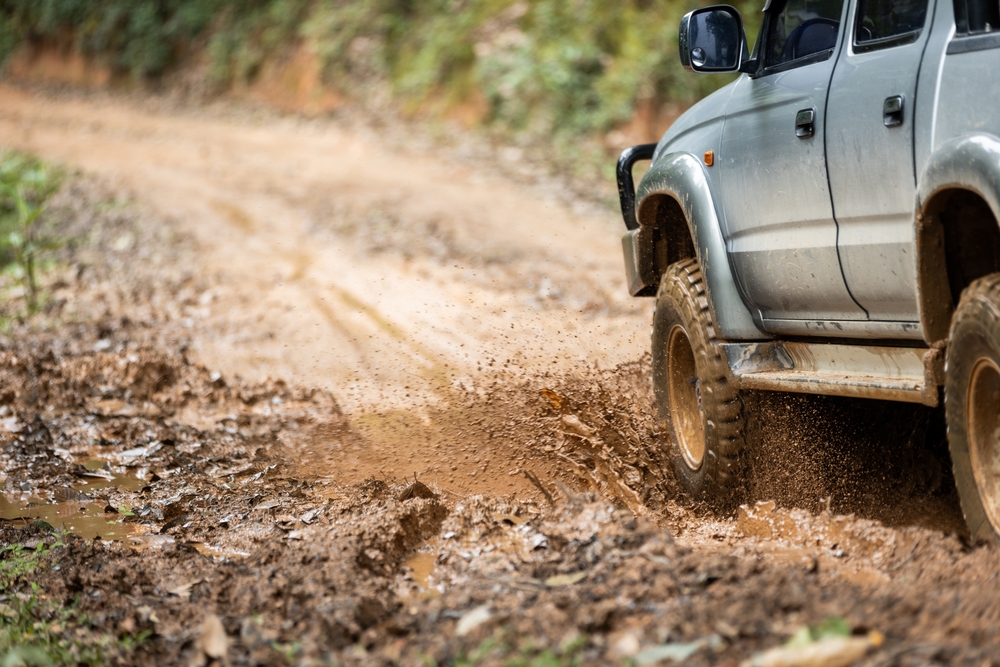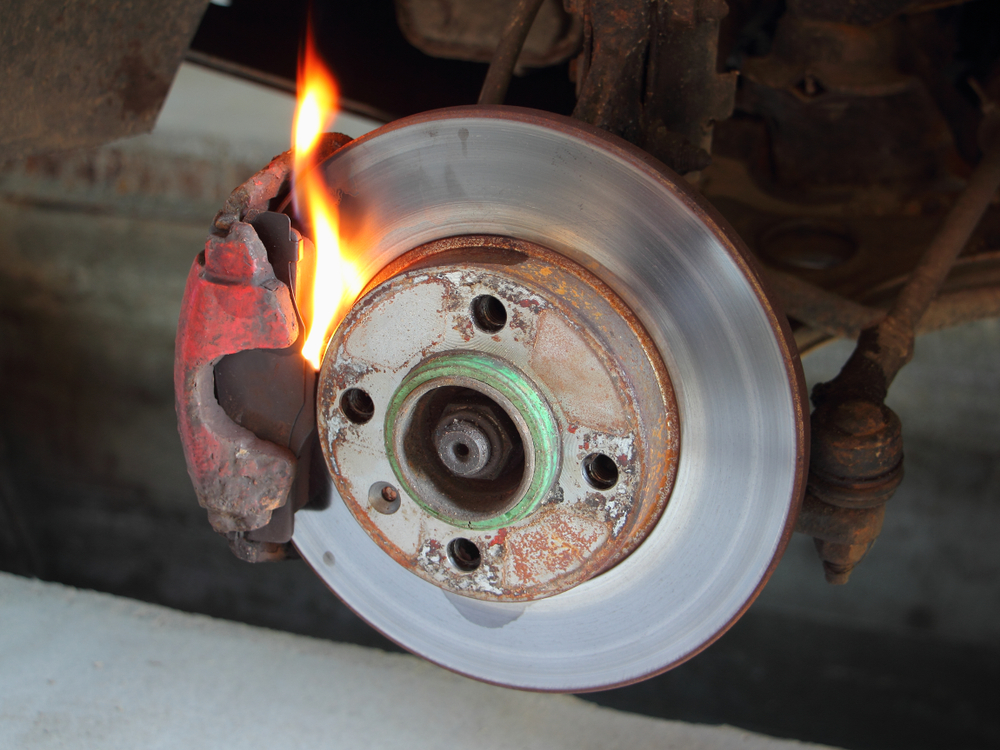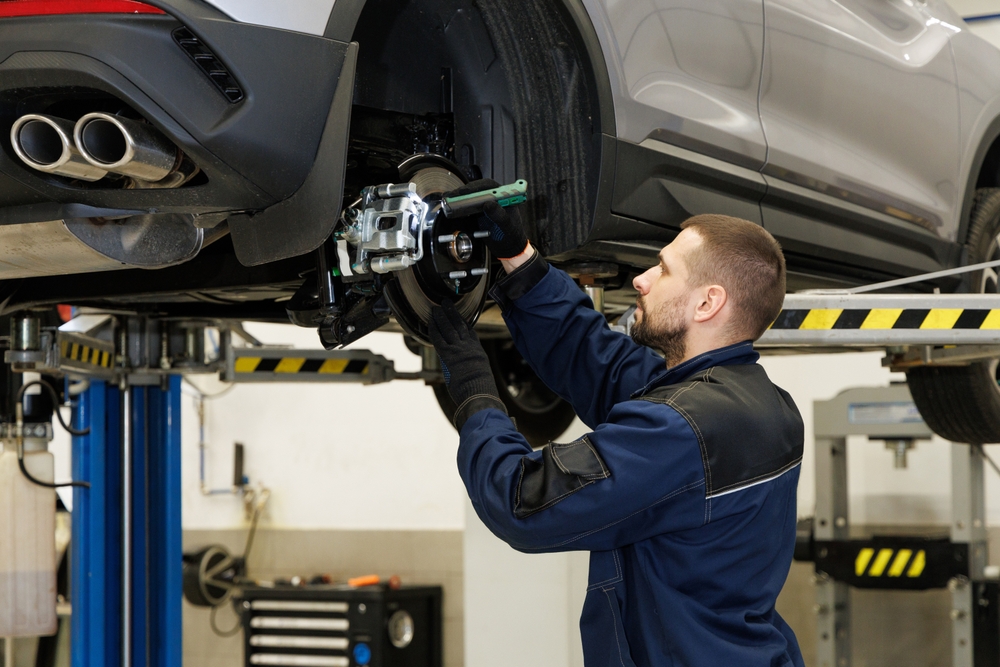When you’re navigating Colorado’s breathtaking mountain terrain—whether conquering the iconic 19-mile Pikes Peak Highway or exploring the winding backroads around Manitou Springs—your Nissan’s braking system becomes your most critical safety partner. The steep grades, sudden elevation changes, and unpredictable weather conditions that make Colorado Springs such an incredible place to live also demand peak brake performance from your vehicle. At Woodmen Nissan Service Center, we understand that mountain driving isn’t just about getting from point A to point B; it’s about confidently handling every switchback, steep descent, and sudden weather change that Colorado’s high country throws your way.
Why Your Nissan’s Brakes Are Your Best Friend on Colorado’s Mountain Roads
Colorado’s mountain roads present unique challenges that your brakes simply don’t face during regular city driving around Colorado Springs. When you’re descending from the 14,115-foot summit of Pikes Peak or navigating the steep grades throughout El Paso County, your brake system works exponentially harder than it would on flat terrain. The continuous downward pressure required to maintain safe speeds on steep grades generates intense heat that can quickly overwhelm unprepared brake components.
Your Nissan’s braking system is specifically engineered to handle these demanding conditions, but only when it’s properly maintained and inspected. Modern Nissan vehicles feature advanced brake technologies like Electronic Brake Force Distribution and Vehicle Dynamic Control that work seamlessly together to provide optimal stopping power on mountain roads. However, these sophisticated systems can only perform effectively when your brake pads, rotors, and brake fluid are in excellent condition. That’s where regular mountain-focused brake service becomes absolutely essential for your safety and confidence.
Mountain driving also means dealing with rapidly changing weather conditions that can affect your braking performance dramatically. During Colorado’s unpredictable spring weather, you might encounter dry pavement at the base of a mountain and snow-covered roads just a few thousand feet higher. Your brakes need to adapt instantly to these changing conditions, making regular maintenance and inspection even more critical for safe mountain adventures. For more information about our comprehensive service center capabilities, visit our facility where expert technicians understand the unique demands of Colorado mountain driving.
The Dangers of Worn Brakes on Steep Grades and Winding Roads
Brake failure on mountain roads isn’t just inconvenient—it’s genuinely dangerous and can lead to catastrophic consequences. As the City of Colorado Springs warns drivers, “hot brakes can fail” and Rangers at Pikes Peak actively conduct brake temperature checks during peak periods to prevent dangerous situations. When brake components overheat from continuous use on steep descents, they can lose their ability to create the friction needed to stop your vehicle effectively.
Worn brake pads compound this problem significantly because they create less friction even under normal conditions, meaning they reach dangerous temperatures much faster on mountain roads. When brake pads wear thin, the metal backing plates can make contact with your rotors, creating a grinding sound and dramatically reducing stopping power. On a steep mountain descent, this scenario can quickly become life-threatening, especially when you’re sharing narrow roads with other vehicles and dealing with limited escape routes.
Beyond the immediate safety concerns, brake problems on mountain roads can strand you in remote locations where help might be hours away. During winter months, being stuck on a mountain road due to brake failure can expose you to serious weather-related dangers. The Colorado Department of Transportation specifically advises drivers to “check brake function and adjustment before descending” and emphasizes using low gears rather than riding brakes to prevent overheating. This professional guidance underscores just how seriously Colorado transportation authorities take mountain brake safety.
Signs Your Nissan’s Brakes Need Service Before Your Next Mountain Adventure
Recognizing the warning signs of brake problems before you head into the mountains can save your life and prevent a ruined adventure. The most obvious indicator is unusual sounds—squealing, grinding, or metal-on-metal scraping when you apply the brakes signals that your brake pads have worn dangerously thin and need immediate replacement. These sounds become even more pronounced during mountain driving because of the increased stress on your brake system.
Pay attention to how your brake pedal feels during normal driving around Colorado Springs. If the pedal feels spongy, sinks toward the floor, or requires more pressure than usual to achieve the same stopping power, these symptoms indicate potential brake fluid issues or worn brake components. Mountain driving amplifies these problems because you rely on your brakes more frequently and intensively than during regular city driving.
Visual inspection can also reveal important clues about your brake condition. Look through your wheel spokes to examine your brake rotors—if you see deep grooves, discoloration from heat, or an uneven surface, these signs indicate that your rotors need professional attention. Additionally, if you notice brake dust accumulation that seems excessive or if your wheels appear unusually dirty after short drives, these symptoms might indicate brake pad wear that requires immediate professional evaluation.
- Squealing or grinding noises: These sounds indicate worn brake pads that need immediate replacement to prevent rotor damage and ensure safe mountain driving.
- Spongy or soft brake pedal: This feeling suggests brake fluid problems or air in the brake lines that can lead to complete brake failure on steep descents.
- Vehicle pulling to one side: When your Nissan pulls left or right during braking, it indicates uneven brake wear that can cause dangerous handling issues on winding mountain roads.
- Vibration through brake pedal: This sensation typically means warped rotors that reduce braking effectiveness and can worsen rapidly under mountain driving conditions.
- Brake warning light activation: Your Nissan’s brake warning system alerts you to potential problems that require immediate professional attention before mountain driving.
Why Choose Woodmen Nissan for Your Pre-Mountain Road Trip Brake Inspection
Woodmen Nissan Service Center brings decades of experience specifically serving Colorado Springs drivers who regularly tackle mountain roads. Our team understands exactly what mountain driving demands from your Nissan’s brake system because we live and drive in these same challenging conditions every day. As a locally owned and operated business, we provide “the security of the Nissan promise and the neighborly care of a local car repair shop”, ensuring you receive both professional expertise and personal attention.
Our Nissan-certified technicians use the latest diagnostic technology and genuine Nissan parts to ensure your brake system performs flawlessly on Colorado’s demanding mountain terrain. We don’t just check your brake pads and call it good—our comprehensive brake inspection evaluates every component of your braking system, including brake fluid condition, rotor thickness, brake lines, and the advanced electronic systems that help your Nissan maintain control on steep grades and slippery surfaces.
What sets us apart is our understanding of how different mountain driving scenarios affect your brake system differently. Whether you’re planning to tackle Pikes Peak, explore the backcountry around Woodland Park, or navigate the steep grades on your daily commute, we tailor our brake service recommendations to match your specific driving needs. This personalized approach ensures you’re not paying for unnecessary services while guaranteeing that critical safety components receive the attention they need.
We offer convenient amenities like complimentary shuttle service and battery checks, plus we “strive to meet the needs of our customers and make their lives easier every time they come in to the service bay”. This commitment to convenience means you can easily fit brake maintenance into your busy schedule without disrupting your mountain adventure plans. To learn more about our comprehensive automotive services beyond brake maintenance, explore our other service offerings.
Our Nissan-Certified Brake Service Process
Our comprehensive brake inspection process begins with a detailed visual examination of all brake components visible through your wheels, followed by a test drive that simulates mountain driving conditions. During this evaluation, we specifically look for signs of heat damage, uneven wear patterns, and performance issues that might not be apparent during normal city driving but become critical problems on steep mountain grades.
We measure brake pad thickness with precision instruments to determine exactly how much useful life remains in your pads. For mountain driving, we recommend replacing brake pads before they reach the minimum thickness because mountain conditions accelerate wear and demand maximum friction capacity. Our technicians also carefully inspect your brake rotors for warping, scoring, or heat damage that can compromise braking performance on long descents.
Brake fluid analysis is particularly important for Colorado drivers because brake fluid absorbs moisture over time, and moisture reduces the fluid’s boiling point. During intensive mountain braking, contaminated brake fluid can actually boil, creating vapor bubbles that make your brake pedal feel spongy and reduce stopping power dramatically. We test your brake fluid’s condition and replace it when necessary to ensure reliable performance under demanding conditions.
| Brake Service Component | Standard Inspection | Mountain-Focused Enhancement | Why It Matters for Colorado Driving |
|---|---|---|---|
| Brake Pad Inspection | Visual thickness check | Precision measurement + heat damage assessment | Mountain driving accelerates wear and generates extreme heat |
| Rotor Evaluation | Surface condition check | Thickness measurement + warping detection | Steep descents can warp rotors and reduce braking effectiveness |
| Brake Fluid Analysis | Fluid level check | Moisture content testing + boiling point verification | High-altitude conditions affect fluid performance under stress |
| Brake Line Inspection | Visual leak check | Pressure testing + corrosion assessment | Temperature extremes can affect brake line integrity |
After completing our thorough inspection, we provide you with a detailed explanation of our findings and clear recommendations for any necessary services. We never pressure you into unnecessary repairs, but we do explain how different brake conditions specifically affect mountain driving safety so you can make informed decisions about your vehicle’s maintenance needs.
Frequently Asked Questions
Q: How often should I have my Nissan’s brakes inspected for mountain driving?
A: We recommend brake inspections every 10,000 miles or twice yearly for Colorado Springs drivers who regularly tackle mountain roads. The demanding conditions of steep grades and elevation changes accelerate brake wear compared to flat terrain driving.
Q: What are the key differences between standard brake service and preparing my brakes for mountain roads?
A: Mountain-focused brake service includes heat damage assessment, precision pad thickness measurements, brake fluid moisture testing, and rotor warping detection. We also evaluate your brake system’s performance under the demanding conditions of steep descents and sudden elevation changes.
Q: Are there any specific brake pads you recommend for driving in Colorado Springs?
A: We recommend genuine Nissan brake pads designed for your specific model, as they’re engineered to handle the heat and stress of mountain driving. These OEM pads provide the optimal balance of stopping power, longevity, and heat resistance for Colorado’s challenging terrain.
Q: Can I drive my new Nissan in the mountains without a special brake inspection?
A: Even new Nissans benefit from a pre-mountain inspection to establish baseline conditions and ensure all brake components are properly bedded and functioning optimally. This inspection also familiarizes you with your vehicle’s specific mountain driving capabilities and limitations.
Q: What is the “pulsing” sensation I sometimes feel when braking on steep hills?
A: Brake pedal pulsing typically indicates warped brake rotors, which can develop from excessive heat during mountain driving. This condition reduces braking effectiveness and requires professional attention to ensure safe mountain driving.
Q: How can I tell if my brakes are overheating?
A: Signs of brake overheating include a burning smell, reduced stopping power, spongy brake pedal feel, or visible smoke from your wheels. If you experience any of these symptoms, safely pull over immediately and allow your brakes to cool before continuing.
Don’t Wait for a Warning: Schedule Your Nissan Brake Service Today
Don’t let brake problems ruin your mountain adventures around Colorado Springs and the Front Range. The Nissan-certified experts at Woodmen Nissan Service Center are here to ensure your braking system performs flawlessly, whether you drive a brand-new Nissan Pathfinder or a trusted Sentra that’s been navigating Colorado’s roads reliably for years. We have the right diagnostic tools, genuine Nissan parts, and specialized mountain driving knowledge to handle any brake issue efficiently and effectively.
With Colorado’s steep mountain grades and unpredictable weather conditions demanding peak brake performance year-round, waiting to address brake problems only makes the situation more dangerous and potentially more expensive to fix. Our comprehensive mountain-focused brake inspection identifies exactly what your system needs, ensuring you get appropriate service that solves the problem rather than just temporary fixes that fail when you need stopping power most.
Click here to schedule your brake inspection and drive with complete mountain confidence!
Or visit us at 6840 Vincent Drive, Colorado Springs, CO 80918, and let our certified technicians ensure your brakes are ready for whatever Colorado’s demanding mountain terrain throws your way.




